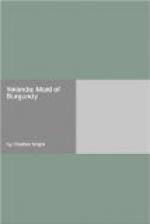To Max the people of the world were of two conditions: a very small class to whom he must kneel, and a very large number who must kneel to him. Even his mother addressed him publicly as “My Lord Count.” On rare occasions, in the deep privacy of her closet, mother-love would get the better of her and break through the crust of ceremony. Then she indulged herself and him in the ravishing, though doubtful, luxury of calling him “Little Max.” No one but I, and perhaps at rare intervals Duke Frederick, ever witnessed this lapse from dignity on the part of Her Grace, and we, of course, would not expose her weakness to the world.
This love-name clung to Max, and “Little Max,” though somewhat incongruous, was pretty when applied to a strapping fellow six feet two and large of limb in proportion.
When the boy approached manhood, I grew troubled lest this strait-jacket existence in Styria should dwarf him mentally and morally. So I began to stir cautiously in the matter of sending him abroad into the world. My first advances met with a rebuff.
“It is not to be thought of,” said the duke.
“Send the count out to the rude world to associate with underlings? Never!” cried the duchess, horrified and alarmed.
I had expected this, and I was not daunted. I renewed the attack from different points, and after many onslaughts, I captured the bailey of the parental fortresses; that is, I compelled them to listen to me. My chief point of attack was Max himself. He listened readily enough, but he could not see how the thing was to be done. When I spoke of the luxuries of Italy and Burgundy, and told him of deeds of prowess performed daily throughout the world by men vastly his inferior, his eyes brightened and his cheek flushed. When I talked of wealth to be won and glory to be achieved in those rich lands, and hinted at the barren poverty of Styria, he would sigh and answer:—
“Ah, Karl, it sounds glorious, but I was born to this life, and father and mother would not forgive me if I should seek another destiny. Fate has fixed my lot, and I must endure it.”
I did not cease my lay; and especially was the fat land of Burgundy my theme, for I knew it well. Max would listen in enraptured silence. When he was eighteen, I wrote, with deep-seated purpose, several letters to my friend Lord d’Hymbercourt, who was at the time one of the councillors of Charles the Rash, Duke of Burgundy. In those letters I dwelt at length on the virtues, strength, and manly beauty of my pupil.
I knew that Charles often negotiated with other states the marriage of his only child and heiress, Princess Mary. This form of treaty appeared to be almost a mania with the rash Burgundian. I also knew that in no instance had he ever intended to fulfil the treaty. His purpose in each case was probably to create a temporary alliance with that one state while he was in trouble with another. His daughter would inherit a domain richer than that of any king in Europe, and the duke certainly would be contented with nothing less than the hand of an heir to a crown. Suitors for the fair Mary came from every land. All were entertained; but the princess remained unbetrothed.




